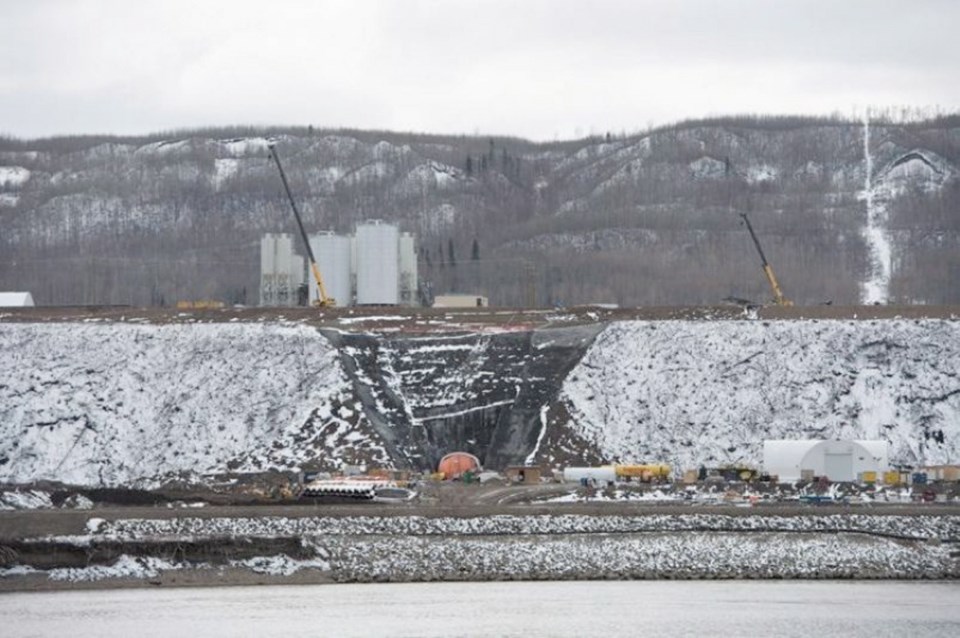The B.C. Utilities Commission will hold meetings this month for residents to give their input on the commission's review of the Site C dam.
The commission will hold 11 community input sessions across the province starting Sept. 23 in Vancouver.
The purpose of the meetings, the commission says, is to gather feedback on its preliminary report set for release Sept. 20.
The commission will be in Prince George on Sept. 29 at the Ramada Hotel before heading to the North Peace starting Sept. 30 in Hudson's Hope at the Pearkes Centre. There will be two sessions in Fort St. John Oct. 1 and 2 at the Pomeroy Hotel. All sessions will take place from 6 to 10 p.m.
The commission will also be making stops in Kamloops, Kelowna, Nelson and Prince George. The commission will be in Nanaimo on Oct. 10 and Victoria on Oct. 11.
The commission is being tasked to study the economic viability of continuing construction on the $8.8-billion project, now two years into construction, based on current electricity supply and demand and its cost to ratepayers.
A final report is due Nov. 1, with the new NDP cabinet expected to make a decision by the end of the fall legislative session on Nov. 30.
The commission received 69 submissions from the public and experts that the commission says will inform its preliminary report.
Chief among them is a submission from Dr. Harry Swain, who chaired the federal-provincial review panel that studied and held public hearings on the dam in 2013 and 2014.
Swain, who has become an outspoken critic of the dam since it was approved by the previous Liberal government in 2014, says construction should be stopped unless the cost to complete is less than $2 billion. He also calls for the flood reserve on the Peace River to be lifted and expropriated properties returned.
"B.C. Hydro's load forecasting is not remotely investment grade," Swain writes.
"It consistently, and by large margins, over-estimates demand, and the overestimates get larger the farther out they go. They are utterly inadequate as the basis for multi-billion dollar decisions, and cannot be relied on for business planning purposes."
Conservation measures remain the cheapest source of electricity, Swain concludes, and that B.C. Hydro should "buy conservation up to the cost of new supply."
"Demand will not materialize at even the low limit of B.C. Hydro's demand forecast," he writes.
"It will be many years before new supply for domestic purposes is necessary; when it is, there are numerous sources that are less expensive than Site C."
In its 866-page filing, B.C. Hydro says it has received more than 200 provincial and federal authorizations to build various aspects of the dam since it was approved and began construction in 2015.
B.C. Hydro says $1.8 billion has been spent on the dam as of June 30, 2017, with expenditures due to reach $2.1 billion by the end of the year.
Much of that has been spent on field and technical studies, land acquisitions, permit approvals, and entering into major construction contracts, Hydro says.
B.C. Hydro says it has entered into $4 billion in contracts. However, none of the construction contracts require termination payments or penalties, it says.
"B.C. Hydro would still be accountable for costs associated with payments for contractor work to date and demobilization costs," Hydro writes.
Hydro estimates the cost of terminating work and remediating the dam site at $1 billion.
"This value represents B.C. Hydro's best estimate based on the available information in the time permitted, and is subject to material uncertainty," it writes. "The scope of remediation would be determined in consultation with regulatory agencies and other stakeholders."
Some $3 billion in total sunk, termination, and remediation costs would need to be recovered from ratepayers if the dam were cancelled, Hydro says, something that would require government or utilities commission approval.
Hydro further estimates a suspension of the project would cost $1.2 billion with two years of ramp-up time needed before construction could restart.
"Suspension introduces significant risk for restarting the project," it says.
"If the project restarts, it would cost more and could take longer to complete."
Hydro maintains the project is on time and on budget, with a contingency budget of more than $800 million, and a year of "schedule contingency" to manage cost overruns and delays.
"Though there remain risks to project execution in the future, B.C. Hydro expects to complete Site C within the existing budget and on the current schedule," it writes.
It also maintains that new energy and capacity resources are needed within the next decade, with or without LNG.
"Our need for new capacity is particularly pressing. It arises within 10 years, regardless of whether any of the proposed LNG projects in British Columbia proceed," it writes.



